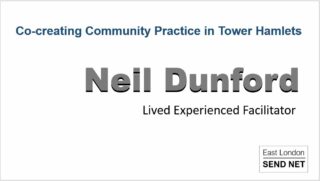In this session, Neil Dunford shared how he has used Communities of Practice and self-managed organisation techniques, such as Liberating Structures, Holacracy, Sociocracy, Deliberately Developmental practice, to transform trust and collaboration in Tower Hamlets.
Watch the webinar
More information and resources from the webinar
Neil has a background which demonstrates his personal passion and professional commitment to building the capacity to provide inclusive, person-centred care for children with additional care and/or learning needs. As a parent of a child with an ultra-rare neurodegenerative condition he knows that when caring for a child with complex needs, some of the most important relationships are with the Health, Education and Social Care practitioners tasked to support of the child.
Yet despite the well-intentioned commitment of all those involved supporting the child, these relationships can easily become strained. Families and professionals often find themselves in adversarial and combative situations which are difficult to defuse and cause stress to everyone involved.
As part of the Q community Communities of Practice Leadership Programme, Neil reimagined both Communities or Practice and the structures which traditionally bring family and professional carers together. He developed an approach which included Family Caregivers and parents in learning conversations with professionals and practitioners about how the child would be cared for. The approach goes well beyond the practice of consulting parents or including families in meetings to share their views – to use self-managed organisational practices, drawn from Holacracy, Liberating Structures, Sociocracy, Deliberately Developmental Organisations – as well as thought-leaders including Helen Sanderson, Susan Basterfield and Jackie LeFevre.
Using Neil’s approach professionals and families worked together to develop meaningful conversations around the support of the child and strengthening the resilience of their circle of support. The approach enhances the capacity for collective decision-making and brokering relationships based on appreciation, understanding, trust and the equitable distribution of power.
This is not just another toolkit for providing person centred care, this is a redefinition of relationships and identities which can reconfigure care.
Upcoming Zooms in this series:
‘Neighbourhood Midwives: The model that boosted continuity of care by 500%’- Annie Francis (1pm-2pm, 22 April 2020)
Learn about the Buurtzorg-inspired model of care enabling self-managing teams of midwives to deliver continuity of care on their own terms.
‘We know New Public Management fails but what else can we do?‘ – Toby Lowe and Gary Wallace (21st May, 1.15pm)
Is there a better way than management by targets? Toby Lowe and Gary Wallace share the pioneering Human Learning Systems approach of Plymouth’s Health & Care system.
Missed earlier sessions from the series? Watch the recordings:
‘Redesigning public services to put relationships at their heart’ – with Katie Rose
‘Buurtzorg in the UK: learnings – and challenges – from the first 3 years’ – with Brendan Martin
Bio
Neil is a Lived Experience Facilitator and is a key contributor to the East London SEND Net, an Asset Based, Person Centred, Peer to Peer Support Network. He is a parent Trustee for the Batten Disease Family Association (BDFA) and also works at the Royal Mencap Society as the Family Engagement Manager for their Early Years programme in Newham, East London. Neil has been working with Helen Sanderson and is Helen’s Coproduction Partner for Families. Most recently, Neil has been working with Jackie LeFevre to develop a Values Based Peer Support (VBPS) model which seeks to reimagine Peer to Peer support, broadening the frame of reference to include everyone within a caring role, as well of those typically receiving the care.”
 Zoom video call - online/phone (all welcome) *12.30pm*
Zoom video call - online/phone (all welcome) *12.30pm*